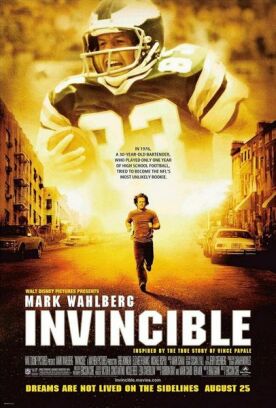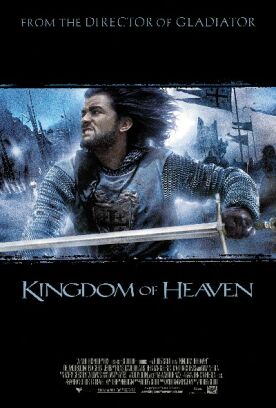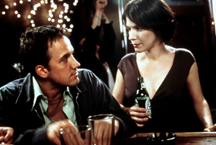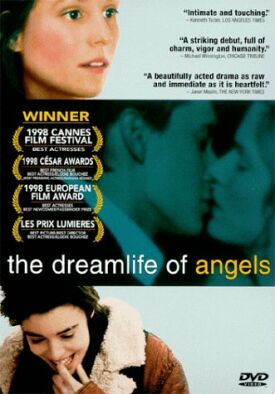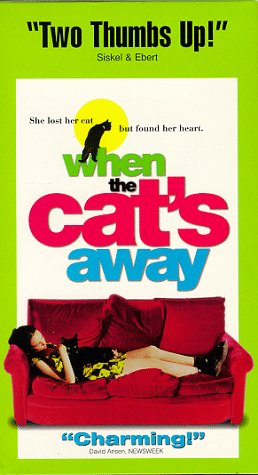Invincible
Invincible by Ericson Core (director) and Brad Gann (writer), is the second film in as many weeks to come my way which purports to be a true story set in the gritty Italian neighborhoods of South Philadelphia. 10th & Wolf was an overwrought gangster flick that was the victim of its own cynicism. Invincible, by contrast is a Cinderella story that is a good deal more enjoyable, though maybe just a bit too starry-eyed for its own good. The film that it most resembles is Rocky, which came out in the same year that Invincible begins and marked a sort of epoch in American film-making. The year before, All the President’s Men had given us the first post-Vietnam, post-honor heroes in the shape of the two plucky journalists who were supposed to have brought down the most powerful man in the world — a man assumed by the film audience to deserve bringing down. In reality, of course, they had done nothing but throw a few sticks on the fire that was used to burn poor old Richard Nixon. But what they had done was to make the point that the hero was no longer to be seen as the man who bends the world to his will; he was, rather, the man who stops someone else from bending the world to his will.
Also, by uncovering the corruption which, as a whole slew of contemporary films taught us, always lay just beneath the surface of the imperial superstate, Woodward and Bernstein taught us not only to mistrust authority but to make heroes of those who saw through the honorable pretenses of authority figures and so provided abundant reasons why that mistrust was deserved. Rocky taught us that there was another way to be a hero: to be a victim. He was up against the old-fashioned hero, the kind who won and who assumed his right to win by boasting. All he had to do was go 15 rounds without being knocked out. The job of this victim-hero was to represent those who felt themselves beaten down by life and who, like Woodward and Bernstein, may have fancied themselves as victims of the heroes of old. At any rate, lots of little guys were prepared to cheer at one of their own who stood up to the representative of success and wealth and who — well, who didn’t win (that was reserved for the increasingly vulgar sequels) but who won our sympathies anyway.
In the same year that Rocky came out, a real-life Rocky in Rocky’s home-town of Philadelphia was living the dream. Rocky famously said that “all I wanna do is go the distance. Nobody’s ever gone the distance with Creed, and if I can go that distance, you see, and that bell rings and I’m still standin’, I’m gonna know for the first time in my life, see, that I weren’t just another bum from the neighborhood.” This is just the view of Vince Papale (Mark Wahlberg), a school-teacher and part-time bartender who answered a call to open tryouts with the Philadelphia Eagles that was really a publicity stunt by the team’s new coach, Dick Vermeil (Greg Kinnear), and actually made the team. There seems a conscious echo of Rocky when Vince’s friends tell him that “even if you’re down there” — that is, at Veterans’ Stadium as an Eagle — “for one hour, you’re down there.” Or “this is a good thing, even if it’s just for a day.” In fact, it was perfect Rocky. Vince was older, never played college football, was regarded by his wife and others as a failure and got insulted and badly beaten up on the field by the regular players. But he hung on. He endured. He didn’t become a superstar or lead his team to the superbowl, but he did well enough to make the team.
That became a symbolic triumph not only for him, not only for declining Philadelphia, images of whose urban and industrial decay are constantly being sought out by the camera, and not only for factory workers like Vince’s dad (Kevin Conway) throughout the Rust Belt whose jobs were disappearing in the painful economic adjustments of the period. It was also a victory for people everywhere who were afraid that their lives were failures. The words of the note Vince’s wife (Lola Glaudini) writes when she leaves him — “You’ll never go anywhere; you’ll never make any money; you’ll never make a name for yourself” — must to this day haunt many of those who appear to the world to be living comfortable, happy and successful lives.
It’s a genuinely inspirational message, but as in Rocky — as in World Trade Center — there’s also a hint of victim-chic in this, a tendency to wallow a bit in Vince’s downtroddenness that may remind us of Sylvester Stallone’s reveling in Rocky’s post-fight appearance with a face like a piece of raw meat. The movies today generally have a hard time with those who dare greatly and win — or those who, like James J. Braddock in Cinderella Man, do not suffer in picturesque or pathetic ways. Braddock actually won his fight and got to be champ for a little while, which may help to explain why the movie was a disppointment. Winners are not half so interesting to us as those whose few triumphs are only symbolic ones. Even so, Vince is a genuine hero, with guts and heart and “character,” which is the quality Dick Vermiel particularly prizes, and there are not so many of these in the movies today that we shouldn’t be grateful for him.
Discover more from James Bowman
Subscribe to get the latest posts to your email.

